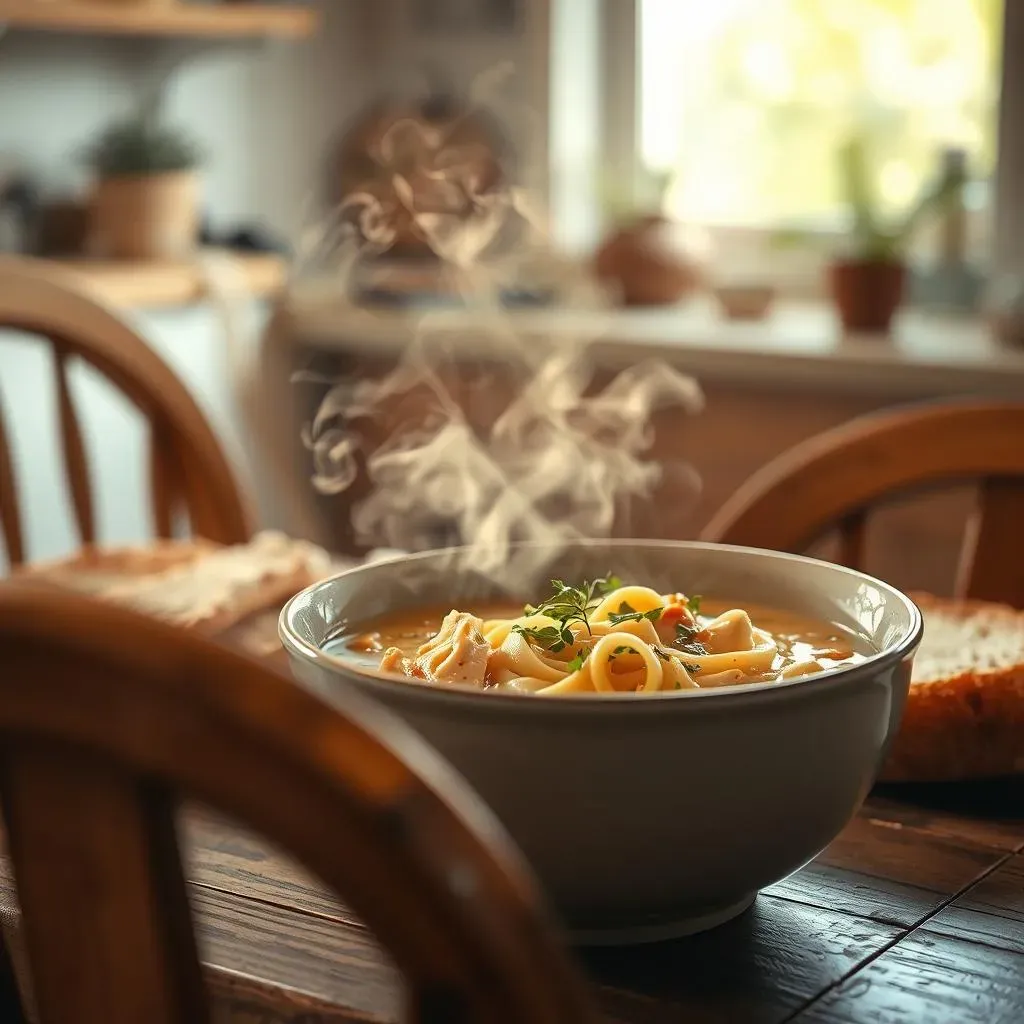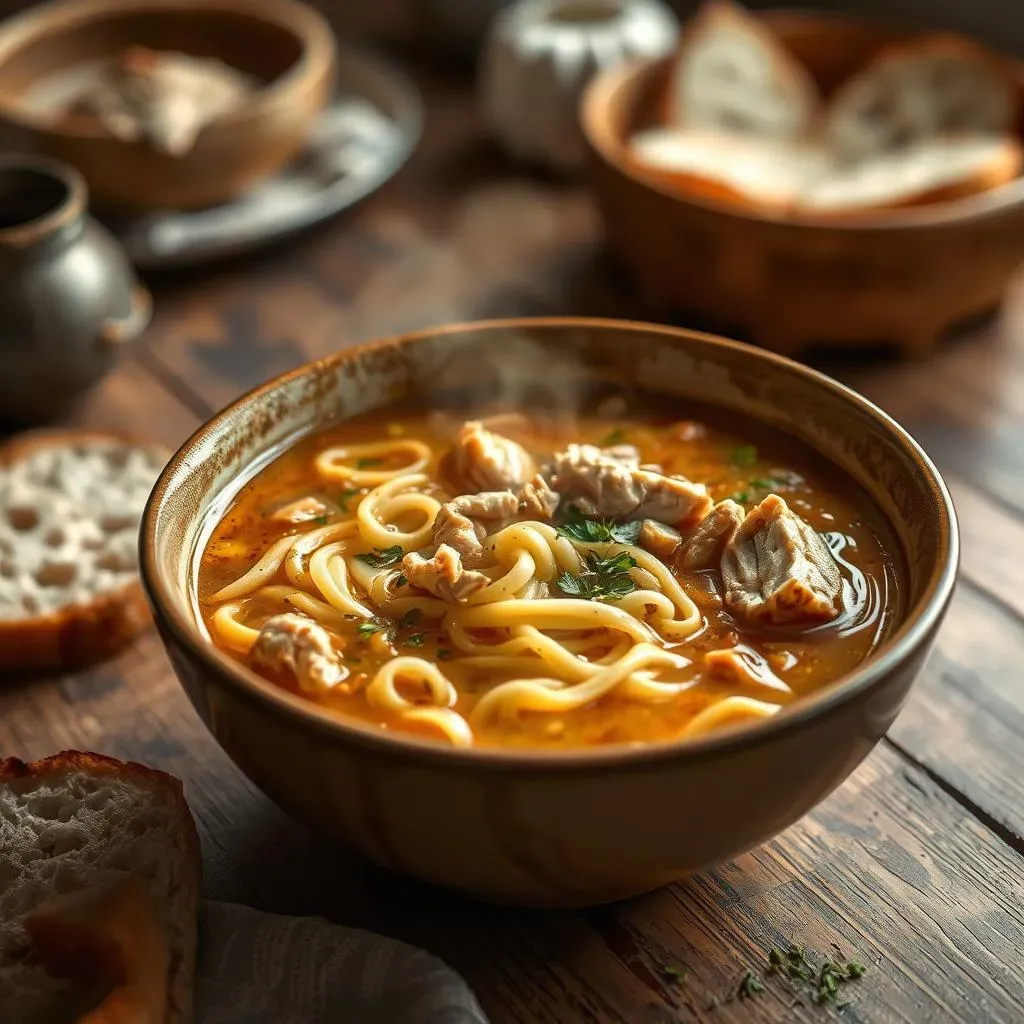Table of Contents
Picture this: you've just finished a comforting bowl of homemade chicken noodle soup, the kind that warms you from the inside out. Maybe you made a big batch, or perhaps you've got some leftovers from a cozy night in. Now, the big question pops up: "is chicken noodle soup good the next day?" It's a question that has crossed many minds, and it's about more than just taste; it's about safety and getting the most out of your cooking efforts. This article will guide you through the ins and outs of enjoying leftover chicken noodle soup. We'll explore how long it stays safe to eat, how to keep it fresh, and the best ways to reheat it to bring back that delicious, home-cooked flavor. We'll also tackle some common concerns and questions, ensuring you can enjoy your soup the next day with confidence and without worry. So, if you've ever wondered if that second bowl is a good idea, keep reading – you're in the right place. We are about to answer is chicken noodle soup good the next day.
Chicken Noodle Soup: A DayAfter Delight or Disaster?

Chicken Noodle Soup: A DayAfter Delight or Disaster?
The Allure of Leftovers
Let's be honest, sometimes chicken noodle soup tastes even better the next day. The flavors have had time to mingle and deepen, creating a richer, more complex experience. It's like the soup has gone on a mini flavor vacation overnight, and it returns even more fabulous. But, is it always a culinary win? That's the question we need to unpack.
It's not just about the taste; it's about knowing if your soup is safe to eat after it has been hanging out in the fridge. We've all been there, eyeing that container of deliciousness and wondering if it's still good to go. We don't want to be playing food roulette, so let's get down to the facts.
The Potential Pitfalls
While leftover soup can be a delightful treat, it's not without its risks. The main concern is bacterial growth. Chicken and other ingredients can become breeding grounds for unwanted bacteria if not stored properly. These little guys love a good party, and your soup can become their favorite venue if you’re not careful. Nobody wants an unwanted guest appearance of food poisoning.
The key to a safe next-day soup is proper handling and storage, it is not just about tossing the bowl into the fridge and hoping for the best. We need to be aware of the temperature danger zone, and how quickly you get your soup chilled down. It is important to do it right, and if you do, you can enjoy your leftovers without any worries.
The Verdict: Delight or Disaster?
So, is it a delight or a disaster? It really depends. With a bit of care and attention, your chicken noodle soup can absolutely be a day-after delight. It’s all about being smart about storage, knowing how long it's been in the fridge, and reheating it properly. Leftovers don't have to be a gamble; they can be a delicious reward for your cooking efforts. We just need to know the rules of the game.
We're not here to scare you away from leftovers, but to empower you with the knowledge to enjoy them safely. The next section will cover the safety aspects and how long you can keep your soup in the fridge.
Safety First: How Long Does Chicken Noodle Soup Last?

Safety First: How Long Does Chicken Noodle Soup Last?
The Fridge Lifespan
so you've made this amazing soup, and you want to enjoy it again, but how long can it actually chill in your fridge before it turns into a science experiment? Generally speaking, homemade chicken noodle soup is good for about 3 to 4 days when stored properly in the refrigerator. This isn't a hard and fast rule, but a guideline. Think of it like this: your soup is on a clock, and after 4 days, it's best to say goodbye. It's not that it will automatically turn into something awful after four days, but the risk of bacteria growth increases significantly. So, if you’re aiming for a tasty and safe experience, stick to the 3-4 day rule.
This timeframe is based on the idea that you've cooled your soup down reasonably quickly after cooking, and you've stored it in an airtight container. We're not talking about leaving it on the counter for hours and then sticking it in the fridge. That's a whole different ball game, and not one you want to play. The faster you get your soup cooled, the safer it will be. Also, remember that if you use older ingredients, like chicken that is already near its use-by date, your soup will have a shorter fridge life. So, always start with the freshest ingredients you can.
Factors Affecting Freshness
Several things can impact how long your soup stays good. First, how quickly did you cool it? Letting it sit out at room temperature for too long is a big no-no. The longer it sits out, the more time bacteria have to multiply. Also, the container matters. An airtight container is your best friend here, it helps to keep out any unwanted guests like bacteria or weird fridge smells. Think of it as a cozy little house for your soup, protecting it from the elements.
Another thing to keep in mind is what's in your soup. If you've got a lot of dairy, like cream, that can shorten the lifespan a bit. Dairy tends to spoil faster than other ingredients. Also, if you used older vegetables that were already on their way out, that can affect how long the soup will last. Basically, the fresher the ingredients, the longer your soup will stay good. So, always go for the best quality you can. And if you're ever in doubt, when it comes to food safety, it’s always better to be safe than sorry.
Storage Time | Temperature | Safety |
|---|---|---|
Up to 3-4 days | Refrigerated (40°F or below) | Generally safe |
More than 4 days | Refrigerated (40°F or below) | Increased risk of bacterial growth |
More than 2 hours at room temperature | Room temperature (above 40°F) | Not safe, discard |
Reheating and Reviving: Getting the Best from Leftover Soup

Reheating and Reviving: Getting the Best from Leftover Soup
The Art of Reheating
so your soup has been chilling in the fridge, and now you're ready for round two. But, how do you bring it back to its former glory? The key is gentle reheating. You don't want to blast it with high heat and turn it into a sad, overcooked mess. Instead, think slow and steady. The stovetop is your best friend here; it allows for even heating and gives you more control. Just pour your soup into a pot and heat it over medium-low heat, stirring occasionally. This way, you'll avoid scorching the bottom and keep all the flavors intact. It's like giving your soup a warm hug instead of a jolt.
If you're in a rush, the microwave is an option, but proceed with caution. Use a microwave-safe bowl and heat in short intervals, stirring in between. This helps to prevent hot spots and ensures the soup heats evenly. Nobody wants to bite into a scalding chunk of chicken while the rest of the soup is still lukewarm. Think of it like giving the microwave a gentle nudge, not a full-on power surge. And remember, patience is key. Don't try to rush the process; your soup will thank you for it.
Reviving the Flavor
Sometimes, after a night in the fridge, your soup might taste a little…flat. Don't worry; it's not a lost cause. You can revive the flavors with a few simple tricks. A squeeze of fresh lemon juice or a splash of vinegar can add a bit of brightness and zing. It's like waking up the taste buds. You could also add a pinch of salt or some fresh herbs to bring the flavors back to life. Think of it as a little flavor boost, a mini-makeover for your soup. You're not just reheating it; you're giving it a second chance to shine.
Another great trick is to add a bit of fresh broth or water if your soup has become too thick overnight. This will help to thin it out and make it more palatable. Sometimes, the noodles absorb a lot of the liquid, leaving you with a gloopy mess. Adding a bit more liquid will bring it back to the perfect consistency. It's like giving the soup a refreshing drink, helping it to loosen up and be its best self again. So, don't be afraid to tweak it a bit; your taste buds will thank you for it.
Reheating Method | Pros | Cons |
|---|---|---|
Stovetop | Even heating, better flavor retention | Takes longer, requires more attention |
Microwave | Quick, convenient | Can result in uneven heating, may affect flavor |
The Final Scoop on Next-Day Soup
So, is chicken noodle soup good the next day? Absolutely, with a few caveats. It's not just about taste; it's about storing it right and reheating it properly. Remember, your fridge is your friend, and a little care goes a long way in keeping your soup safe and delicious. If you follow the simple guidelines we've discussed, you can confidently enjoy that second bowl (or third!) without any worries. Leftover soup isn't just convenient; it's a chance to savor the flavors all over again. Now, go forth and enjoy your soup, whether it’s fresh off the stove or a delightful day-after treat. And if you still have questions, don't be afraid to ask – we're all about making your kitchen adventures a success.
